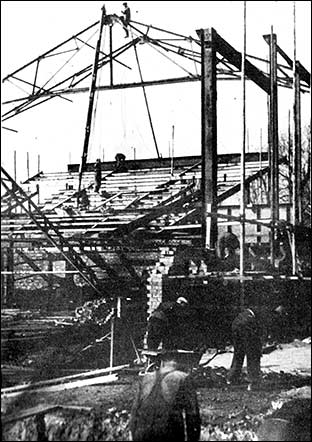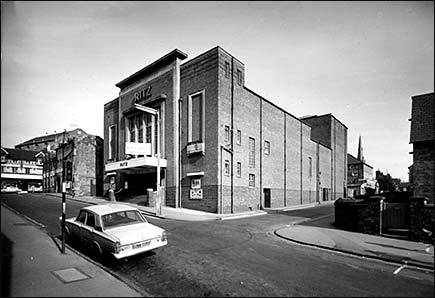|
|||||||
| Evening Telegraph, Tuesday, November 18, 1986, transcribed by Kay Collins |
|||||||
|
Ritz 1986
|
|||||||
|
|||||||
|
An Article by Lester Cowling on a Cinema Birthday
|
|||||||
|
Excitement was mounting in Rushden 50 years ago this week. Residents were eagerly looking forward to the opening night, on November 21, of the Ritz. For the Ritz wasn't just another picture house — it was one of the new "super-cinemas" which were opening up all across the country in 1936. The impressive "futuristic" building, just off the High Street, had been taking shape throughout the summer. Such super-cinemas were quickly dubbed picture palaces — and veritable palaces they were, offering patrons entertainment in warm, well-cushioned and carpeted comfort. They allowed people both to escape for a few hours from their often relatively drab homes and also served up escapist fantasy which allowed many to forget the drudgery of their everyday lives. In the county, 1936 saw the opening of such super-cinemas as the Savoy (now the ABC) at Northampton, the Lyric at Wellingborough, and the Odeon and Regal (Granada) at Kettering. But the foggy night of Saturday, November 21, was all Rushden's. The Ritz was packed to capacity for the opening ceremony with 400 guests plus another 800 who had queued up to hand over their 1s (5p in today's money) or 1/3 (just over 6p) for a ticket. If a slight gasp went up as the curtain was raised on the official stage party, it wasn't because there were any famous film stars - just civic dignitaries and heads of the Palace Theatre Company which owned the cinema — but because of the enormity of the stage. At 71 ft wide by 35 ft deep it was the biggest stage of any theatre or cinema in the county — and possibly in the entire East Midlands. And it is on this massive stage that Rushden Amateur Operatic Society has staged its productions and on which Rushden Amateur Theatrical Society has performed its annual pantomimes. The audience heard Mr J T Richardson, chairman of Rushden Urban Council, call the building "an adornment to the town." When the opening speeches were over, the eager audience settled down to watch the cinema's first film The Trail of The Lonesome Pine. It starred Sylvia Sidney, Fred MacMurray and Henry Fonda and was billed as "the first great outdoor romance filmed entirely in colour". There was also a "full supporting programme" of cartoons and a newsreel. The second half of 1936 was one of those periods when historic news stories were breaking almost every day. Jobless men from Jarrow had marched through the county on their way to protest about their plight at Westminster (although their route did not take them over the newly-opened Irthlingborough Viaduct). Apart from the high level of unemployment, the Left were concerned about the way the Spanish Civil War was going, with Franco notching up victory after victory. Back in Britain, there was some comfort for the working man with the news, reported the same week that the Ritz opened that the Holiday Bill — "providing eight consecutive days annual holiday with pay for all employed persons" — had received its second reading in the House of Commons. Meanwhile within weeks the nation was to be stunned by headlines like the one across the front page of the Evening Telegraph announcing: "The King Has Abdicated" — the uncrowned Edward VIII had opted to relinquish the throne in order to marry a divorcee, Mrs Simpson. But possibly the most significant social development is hinted at in the same edition of the Evening Telegraph as carried the report of the Ritz opening. It was likely, it announced, that there would be some television coverage of the coronation of King Edward. In fact live cameras were the following year to cover part of the coronation procession of his brother George VI. The Evening Telegraph had been full of coverage of the beginning of the BBC's regular television service in London. And it was to be television, of course, that was to be the undoing of the vast cinemas. The picture palaces were packed during the war years and the age of austerity that followed, but by the early 1950s and the coronation of our present Queen, television was set to expand. All over the country cinemas shut down as more and more people stayed at home to watch their own tellies rather than queue in the rain to get in to cinemas. The crunch finally came for the Ritz some 20 years later when, for a while, it looked briefly as if it would close. But now it is happily functioning as a multi-purpose building — the stalls given over to bingo, with bingo-type seating for 400. There remain 480 seats in the balcony, which has been left unchanged and is used for seating during film matinees shown during school holidays. The Ritz retains its large screen, unusual these days when many cinemas have been converted into smaller units. And the audience is accommodated both upstairs and downstairs for the continued operatic society productions and annual pantos. And just a final touch of irony. If you go to the Ritz and think you may have seen those massive stage curtains somewhere before ...... Yes, you have. On television. They come from the London Hippodrome and were bought two years ago when the building was being converted from a theatre to a nightspot. Many of the world's top stars, including Sinatra, have performed with the curtains as a background. "We didn't have to alter them at all," said Mr Leslie Jaffa, whose company runs the Ritz. "The size of the stage at the Ritz is exactly the same as that at the Hippodrome."
|
|||||||


